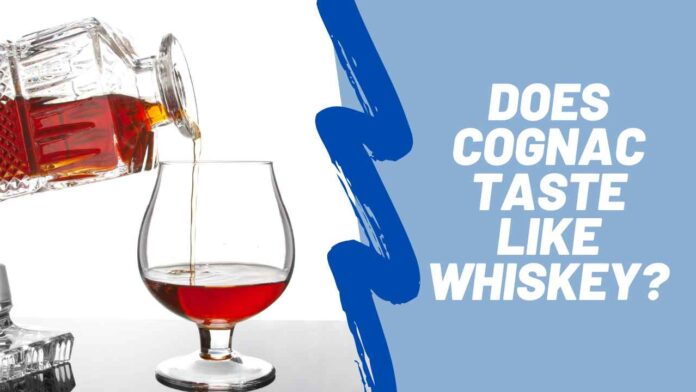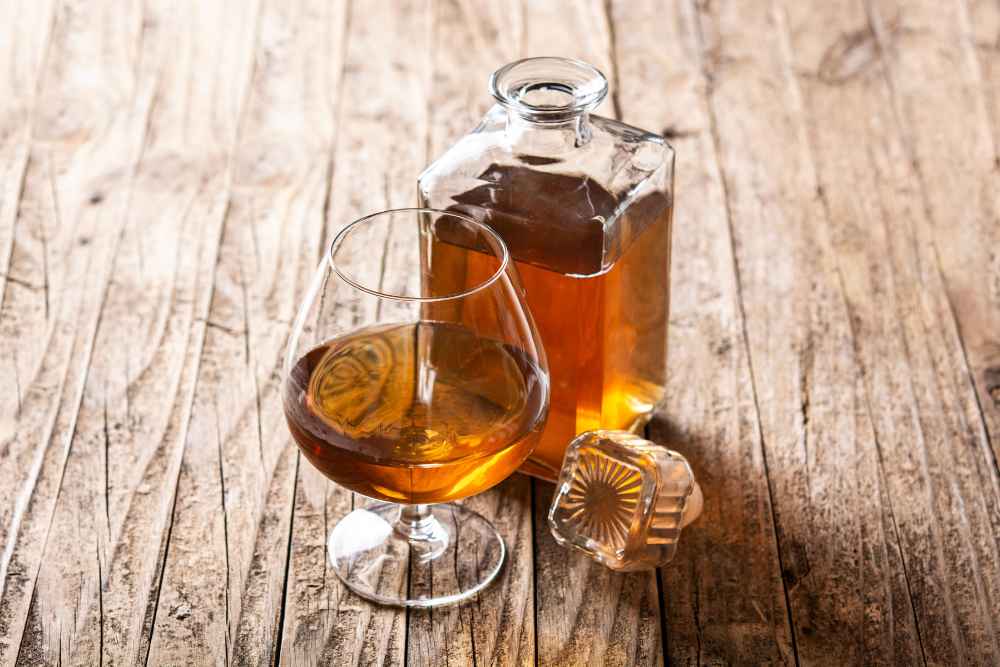This page may contain affiliate links. Please see our Disclaimer for more information. Always drink responsibly and adhere to your local legal drinking age.
Introduction
When savoring fine spirits, subtle differences in flavor and character can make all the difference. From fruit-forward cognacs to smoky whiskeys, understanding these unique taste profiles is key for any cocktail enthusiast.
But does Cognac taste like Whiskey? In this comprehensive guide, we will explore their inherent differences and delve into what makes each distinctive spirit so alluring.
Key Takeaways:
- Cognac and whiskey have distinct taste profiles. Cognac is floral, fruity, spicy, and woody with a strong oak influence, while whiskey is smoky, sweet, spicy, and woody with caramel and vanilla tones.
- The production processes of cognac and whiskey are different. Cognac is made from grapes in the Cognac region of France, while whiskey typically uses malted barley.
- Both spirits are aged in oak barrels to add complexity. The length of time spent aging impacts the final flavor profile for cognacs and whiskeys.
- Understanding the differences between these iconic spirits can help enthusiasts appreciate their unique qualities when savoring them neat or mixing them into cocktails.
Understanding Cognac And Whiskey
Cognac is a type of brandy made from grapes and produced exclusively in the Cognac region of France, while whiskey is typically made from malted barley and aged in oak barrels.
What Is Cognac, And How Is It Made?
Cognac is a type of brandy meticulously crafted from white grapes grown in the Cognac region of France. With strict regulations governing its production, true cognac must be made using one of three approved grape varieties – Ugni Blanc being the most commonly used.
The process begins with grapes being harvested and pressed to create a juice that ferments into wine.
The essence of cognac comes from its unique double-distillation process in copper pot stills. During this stage, impurities are removed while retaining essential flavors and aromas.
Once distilled into “eau de vie,” or “water of life,” it’s aged for at least two years within French oak barrels, which impart distinct characteristics like vanilla notes and hints of woodiness.
What Is Whiskey And How Is It Made?
Whiskey is made from fermented grains, a popular spirit enjoyed by cocktail drinkers and connoisseurs alike. The production process begins with carefully selecting grains such as barley, rye, wheat, or corn.
Once this enzymatic reaction occurs, yeast is introduced to the mixture for fermentation – transforming those sugars into alcohol. After fermentation, the resulting liquid (known as “wash”) moves on to the distillation phase.
Here it’s heated in copper pot stills or column stills for further purification and concentration of flavors.
The next crucial step in whiskey-making involves aging in oak barrels. This stage imparts distinct flavors and characteristics into the spirit while allowing undesirable compounds to evaporate over time.
Throughout this fascinating process–from grain selection through distillation and eventual barrel-aging–the distinctive taste profiles of whiskey emerge: smoky elements from peated malt; sweet notes reminiscent of caramel or vanilla gained through barrel interaction; spicy nuances derived from diverse grain compositions; all culminating in a richly layered sensory experience savored by enthusiasts across the world.
Taste Profile Of Cognac
Cognac has a distinct taste profile and features floral, fruity, spicy, and woody notes with strong oak influences, making it a smooth and complex drink.
Floral, Fruity, Spicy, Woody
Cognac offers a diverse taste profile that appeals to cocktail drinkers, boasting an array of flavors and aromas. These can be categorized into four main groups:
- Floral: Cognac often features delicate floral notes reminiscent of honeysuckle or jasmine, which can add a light, aromatic touch to cocktails.
- Fruity: With flavors ranging from apricot and prune to zesty orange and other citrus fruits, cognac provides a sweet and fruity base for many classic cocktails.
- Spicy: Alongside its fruitiness, cognac also showcases spicy elements like cinnamon and clove, which can give an exciting kick to mixed drinks.
- Woody: The aging process in oak barrels imparts rich, woody notes to cognac, adding depth and warmth to your favorite cocktails.
Smoothness And Complexity
One key characteristic that makes Cognac stand out from Whiskey is its smoothness and complexity. While some whiskies can be quite harsh or smoky, a good Cognac should be incredibly smooth on the palate with complex flavors that evolve as you drink it.
This comes from the careful blending process used in producing each batch of Cognac, where different eau de vie are combined to create a balanced and nuanced final product.
Aged for years in oak barrels, Cognacs develop rich layers of flavor that can include everything from floral notes to spicy undertones, making them an excellent choice for sipping neat or mixed into cocktails.
Strong Oak Influence
The strong oak influence is one of the signature characteristics of both cognac and whiskey. The spirit absorbs flavors from the wood, giving it a rich and complex taste.
Oak barrels are used for maturation because they allow air to pass through, which helps to age the alcohol without over-oaking it.
Oak trees are grown in different regions worldwide, such as America or France, creating unique tastes based on where they grew. French oak is commonly used for cognac production due to its porous structure that allows for good aging. In contrast, American white oak is often used in bourbon production due to its lower density which extracts more flavors during maturation.
Taste Profile Of Whiskey
Whiskey has a rich and warm taste profile with notes of caramel, vanilla, and spice that can be enjoyed neat or in cocktails – read on to learn more about the differences between cognac and whiskey.
Smoky, Spicy, Sweet, Woody
Whiskey is a complex spirit with an array of different flavors and aromas. Here are some of the most common taste profiles you’ll find in whiskey:
- Smoky: Many whiskeys, particularly Scotch, have a smoky flavor that comes from using peat during the malting process. This flavor can vary from subtle to intense, depending on the whiskey.
- Spicy: Whiskey often has a spicy kick to it, with notes of cinnamon, clove, black pepper, and other spices. Rye whiskey is mainly known for its spiciness.
- Sweet: Sweetness is also a standard flavor profile in whiskey, with notes of caramel, vanilla, honey, and brown sugar. This sweetness can balance out the smokiness or spice in the whiskey.
- Woody: Whiskey aged in oak barrels will often have a woody flavor profile, with notes of oak, cedar, or even maple syrup. The longer the whiskey is aged in the barrel, the more pronounced the flavor.
Overall, these four taste profiles work together to create a rich and complex drinking experience that is perfect for sipping neat or mixing into cocktails.
Notes Of Caramel, Vanilla, And Spice
Cognac and whiskey can feature caramel, vanilla, and spice notes in their flavor profiles. These flavors come from the aging process, as the spirits absorb them from the barrels they are aged in.
Bourbon casks tend to impart a strong vanilla note, while Scotch casks may give a hint of smokiness to the whiskey’s taste profile.
Cocktail drinkers who enjoy rich and complex flavors will appreciate whiskies with caramel, vanilla, and spice notes. These flavors pair well with mixers like ginger ale or are used in classic cocktails such as Old Fashioned or Manhattan.
Richness And Warmth
Cognac is known for its rich and warm flavors, thanks to the aging process in oak barrels. The longer the cognac ages, the more complex it becomes. Aged cognacs develop a darker color and stronger bouquet with licorice, chocolate, and tobacco notes.
Whiskey also has richness and warmth as an integral part of its flavor profile. Bourbon whiskey has warm caramel and vanilla flavors, while scotch whiskey is known for being smoky and peaty.
Whiskey offers a broad range of flavor profiles that cater to every taste preference. The complexity of whiskey comes from aging and variations in mash bills, distillation processes, cask types, and maturation techniques, among other factors.
Differences Between Cognac And Whiskey
Cognac and whiskey differ in their distillation process, aging technique, region and grape variety used in Cognac, grain and mash bill utilized in whiskey production, and the maturation techniques employed; read on to learn more about these distinguishing factors.
Distillation Process
During the distillation process, both cognac and whiskey undergo a similar procedure. The fermented liquid is heated in a still until it vaporizes, then condensed back into its liquid form.
However, some differences in the distillation process make these two spirits unique.
Cognac is typically distilled twice using copper pot stills, giving it a smoother taste profile than whiskey. On the other hand, whiskeys are often distilled multiple times using column stills or even pot stills to create different flavor profiles for each type of whiskey.
Aging Process
The aging process plays a crucial role in determining the flavor profile of both cognac and whiskey. Both spirits are aged in oak barrels, which add complexity and depth to the final product.
The time spent in the barrel can range from a few years to several decades. During this time, the liquid can extract flavors and subtle nuances from the wood, resulting in a richer tasting experience.
For instance, older cognacs are known for their smoothness and deep woody notes, while whiskies aged for longer tend to become more complex in taste and full-bodied with hints of caramel, vanilla, or spice.
Region And Grape Variety Used In Cognac
The region and grape variety used in Cognac are essential elements that contribute to its unique taste profile. Cognac can only be produced in the Cognac region of France, which is divided into six different growing regions.
The grapes used for cognac production come from vineyards in this delimited area and must be made exclusively from the Ugni Blanc grape variety.
Combining the specific grape variety with the terroir of the Cognac region gives cognacs their unique character. Interestingly, while only one type of grape is allowed for making cognacs, each producer has their own methods and techniques that result in distinct flavors and aromas within their products.
Grain And Mash Bill Used In Whiskey
The grains used in whiskey production are essential to its taste profile. For instance, bourbon must contain at least 51% corn, which gives it a sweet and smooth flavor.
On the other hand, Rye whiskey has a spicy and robust taste because it contains at least 51% rye grain in the mash bill. Other grains used in whiskey include barley and wheat, which contribute to different flavors and textures.
Understanding the mash bill is crucial for determining what type of whiskey you prefer. Some distilleries may use unique blends of grains to create distinct flavors that cater to particular tastes.
Production Methods And Maturation Techniques
Cognac and whiskey have unique production methods, which contribute to their different taste profiles. Cognac is made from grapes, fermented into wine before undergoing double-distillation using Alembic pot stills.
The final product must then be aged in oak barrels for at least two years, with some premium cognacs being aged for decades. In contrast, whiskey is typically made from malted grains like corn, barley, or rye before being mashed and distilled in copper pot stills.
The aging process varies depending on the type of whiskey produced; bourbon must be aged in new charred oak barrels, while scotch is often aged for several years in used barrels previously utilized by bourbon or sherry distilleries.
Can Cognac Taste Like Whiskey?
Let’s compare the taste profiles of Cognac and Whiskey to see if they can be interchangeable; read on to find out!
Comparing The Taste Profiles Of Cognac And Whiskey
Comparing the taste profiles of Cognac and Whiskey can be an exciting and informative exercise, especially for those who enjoy sipping on these fine spirits. To help you understand the similarities and differences between Cognac and Whiskey, we’ve created a table outlining the key characteristics of each.
| Aspect | Cognac | Whiskey |
|---|---|---|
| Primary Flavors | Floral, fruity, spicy, and woody notes | Smoky, spicy, sweet, and woody notes |
| Secondary Flavors | Smoothness and complexity with strong oak influence | Notes of caramel, vanilla, and spice with richness and warmth |
| Distillation Process | Double distillation in copper pot stills | Single or double distillation in copper stills or column stills |
| Aging Process | Aged in French oak barrels for a minimum of 2 years | Aging duration and type of barrels can vary depending on the whiskey |
| Region and Ingredients | Produced in the Cognac region of France using specific grape varieties | Made worldwide using various grains and mash bills |
| Production Methods and Maturation Techniques | Strictly regulated by the French government | More freedom in production guidelines and techniques |
| Food Pairings | Can be paired with cheese, seafood, desserts, and savory dishes | Also pairs well with cheese, seafood, desserts, and savory dishes |
As you can see, there are slight differences in taste profiles between Cognac and Whiskey, mainly due to the distillation process, aging, and ingredients used. Although they may share some similarities in flavor, each spirit offers a unique tasting experience for cocktail drinkers.
Similarities And Differences In Flavor
While both Cognac and Whiskey are distilled spirits aged in oak barrels, they have distinct flavor profiles. Cognac is known for its smoothness, complexity, and strong oak influence, with floral, fruity, spicy, and woody undertones.
On the other hand, Whiskey has a smoky sweetness with notes of caramel and vanilla.
Additionally, the production process significantly influences flavor differences between Cognac and Whiskey. While Cognac is made from white wine grapes exclusively grown in the Cognac region of France using pot stills for distillation before being matured for at least two years in French oak casks, whiskey’s mash bill can be made up of various grains like malted barley or rye that undergo fermentation before being distilled using copper pot stills.
Pairing Cognac And Whiskey With Food
Pairing cognac with cheese and seafood is a classic choice, while whiskey goes well with savory meats and desserts.
Cheese Pairings
Are you looking for the perfect cheese pairing with your cognac or whiskey cocktails? Here are some suggestions for cocktail drinkers:
- Younger cheeses work best with younger cognac, while more mature cheeses pair well with more mature cognac.
- Blue cheese is the perfect match for a sweet and smooth cognac.
- Fresh and lighter cheeses like goat cheese, brie, and camembert pair well with younger cognacs.
- Mature cheeses such as cheddar, gouda, and emmental pair well with older cognacs.
- Hard cheeses like parmesan and pecorino romano pair well with smoky and spicy whiskeys.
- Creamy cheeses like ricotta or mascarpone can be paired with fruity or floral cognacs.
- Pairing cheese with cognac is a common practice and an art form – experiment to find your perfect match!
Seafood Pairings
Cognac is an excellent complement to seafood dishes, with its floral and fruity flavor profiles. Here are some of the best seafood pairings for cognac:
- Oysters – Pair fresh oysters with a light and crisp cognac from the Grande Champagne region, such as Hennessy Pure White. The refined floral profile of the cognac complements the salinity of the oysters.
- Grilled Lobster – Try pairing grilled lobster with a rich and complex cognac like Rémy Martin XO or Courvoisier XO. The warm notes of oak and spice in these cognacs perfectly balance the buttery flavors of grilled lobster.
- Shrimp Cocktail – Pair shrimp cocktail with a tangy and fruity cognac like Martell Cordon Bleu or Camus VSOP Borderies. These cognacs have hints of apricot, peach, and tropical fruits, which complement the tanginess of shrimp cocktail sauce.
- Salmon – Pair roasted salmon fillets with a smooth and woody cognac like Hine Antique XO or Frapin 1270 Grande Champagne. These cognacs have a strong oak influence, providing an earthy balance to the fatty flavors of salmon.
- Sushi – Pair with light-bodied and floral cognac like Delamain Pale & Dry XO or Godet Antarctica Icy White. The fruitiness and tanginess in these cognacs are perfect for complementing the ocean-like flavors of sushi.
So next time you’re enjoying your favorite variety of seafood, consider trying one of these delicious pairings with a glass of smooth and warming cognac!
Dessert Pairings
Cognac is a perfect pairing for desserts, as it has a smooth and complex flavor that complements the richness of sweet dishes. Here are some of the best dessert pairings with cognac:
- Chocolate – Cognac pairs well with dark chocolate, which has a bitterness that balances the sweetness of cognac.
- Fruit Tart – The floral and fruity notes in cognac complement the flavors of fresh fruit tarts to create a delightful combination.
- Crème Brûlée – The creamy texture and rich vanilla flavor of crème brûlée make it an excellent choice to pair with cognac.
- Apple Pie – The strong oak influence in cognac pairs well with baked apple dishes like pies, adding depth and complexity to the flavor profile.
- Cheesecake – Cognac’s smoothness and warmth pair well with dense cheesecakes, enhancing its creamy texture and buttery crust.
When pairing cognac and dessert, choosing flavors that complement each other without overpowering one another is essential. With its complex flavor profile, cognac can elevate any sweet dish into something remarkable.
Savory Pairings
If you’re a cocktail drinker looking for some savory pairings for your cognac and whiskey, here are some recommendations:
- Cognac: Pair with roasted or grilled meats, such as steak, lamb chops or pork loin. The floral and fruity notes of cognac complement the flavors of the meat, while the oak influence adds complexity.
- Whiskey: Enjoy with charcuterie or cured meats, such as prosciutto or salami. The smokiness and woody notes of whiskey pair well with the salty and savory meats.
- Cognac: Try with dishes featuring mushrooms, such as mushroom risotto or pasta. The earthy flavor of mushrooms complements the spicy and woody notes of cognac.
- Whiskey: Serve alongside hearty soups or stews, such as beef stew or chili con carne. The richness and warmth of whiskey complement the heartiness of these dishes.
- Cognac: Perfect match with strong cheeses like blue cheese or aged cheddar. The smoothness and complexity of cognac balance out the sharpness of these cheeses.
- Whiskey: Best paired with smoked fish like salmon or trout. The smoky and sweet notes in whiskey complement the delicate flavors of the fish.
Remember to consider factors like flavor intensity when pairing your cocktails with food to achieve a perfect balance between both elements!
Popular Brands Of Cognac And Whiskey
Some of the most popular cognac brands include Hennessy, Rémy Martin, Courvoisier, and Martell, while popular whiskey brands include Jack Daniels, Johnnie Walker, Jameson, and Chivas Regal.
Cognac Brands: Hennessy, Rémy Martin, Courvoisier, Martell
If you’re a cocktail drinker looking for the best cognac brands, these four are worth trying:
- Hennessy: Founded in 1765 by Irishman Richard Hennessy, it’s the largest and most well-known cognac house. Their VS (Very Special) blend is popular with balanced fruity and oak flavors.
- Rémy Martin: Established in 1724, their signature blend is the VSOP (Very Superior Old Pale). It has notes of vanilla and dried fruit with a smooth finish.
- Courvoisier: Founded in 1835, they produce cognacs that highlight floral and fruity flavors. Their XO (Extra Old) blend has notes of apricot and cinnamon.
- Martell: Founded in 1715, Martell is a premium brand that produces rich and complex blends. The Martell Cordon Bleu has hints of plum and honey.
Each brand has its own unique flavor profile, so it’s worth trying different blends to find your favorite.
Whiskey Brands: Jack Daniels, Johnnie Walker, Jameson, Chivas Regal
If you’re a cocktail drinker, you’re probably familiar with some of the most popular whiskey brands on the market. Here are some of the best:
- Jack Daniels: A Tennessee whiskey is known for its smooth flavor and charcoal taste.
- Johnnie Walker: A blended Scotch whisky that’s been around since the 1800s. It comes in various flavors and strengths, making it a versatile choice for cocktails.
- Jameson: An Irish whiskey distilled thrice to create a smooth and mellow flavor. It’s great for mixing with ginger ale or lemonade.
- Chivas Regal: A blended Scotch whisky with honey, vanilla, and oak notes. Its rich and complex flavor works well in classic cocktails like Old Fashioneds and Manhattans.
Whether you prefer your whiskey neat or mixed into a cocktail, these brands will impress even the most discerning drinkers.
FAQ
Q: Does Cognac Taste Like Whiskey?
A: Both brown spirits, cognac, and whiskey, have very different taste profiles. Cognac is made from grapes and has a fruity, floral flavor with a hint of spice. On the other hand, whiskey is made from grains and has a smoky, oaky flavor with a touch of sweetness.
Q: What are the main differences between cognac vs bourbon?
A: Cognac is made in the Cognac region of France from grapes, while bourbon is made in the United States from grains. Cognac has a more fruity, floral flavor, while bourbon has a smoky, oaky flavor.
Q: What grape is used to make cognac?
A: Cognac is made from a variety of grapes, including Ugni Blanc, Folle Blanche, and Colombard.
Q: Can you mix cognac in a cocktail?
A: Yes, cognac can be used in various cocktails, such as the Sidecar or the French Connection.
Q: How does cognac vs whiskey taste?
A: Cognac has a fruity, floral flavor with a hint of spice, while whiskey has a smoky, oaky flavor with a hint of sweetness.
Q: Is cognac better than whiskey?
A: It all depends on personal taste. Cognac and whiskey have unique flavor profiles and can be enjoyed in different ways.
Q: What are some popular cognac brands?
A: Hennessy, Remy Martin, and Courvoisier are some of the most popular cognac brands.
Q: What are some popular whiskey brands?
A: Jack Daniel’s, Jim Beam, and Johnnie Walker are some of the most popular whiskey brands.
Q: What’s the difference between cognac and whiskey?
A: Cognac is produced in the Cognac region of France from grapes, while whiskey can be made anywhere in the world from grains. Cognac has a more fruity, floral flavor, while whiskey has a smoky, oaky flavor.
Q: What’s the difference between cognac and whisky?
A: Cognac is made in the Cognac region of France from grapes, while whisky is made in various regions worldwide from grains. Cognac has a more fruity, floral flavor, while whisky has a smoky, oaky flavor.
Conclusion: Understanding The Taste Profiles Of Cognac And Whiskey
In conclusion, while cognac and whiskey are delicious and complex beverages in their own right, they have distinct taste profiles. Cognac has floral, fruity, spicy, and woody notes with a strong oak influence.
In contrast, whiskey is smoky, sweet, spicy, and woody with caramel and vanilla tones. The production methods also differ significantly between the two drinks.
While there may be some similarities between the two spirits’ flavor profiles depending on age or cask type used for maturation purposes, cognac has unique characteristics that make it distinct from whiskey.





















